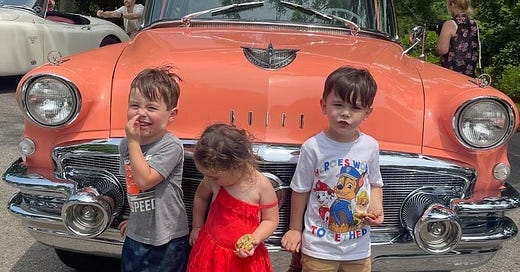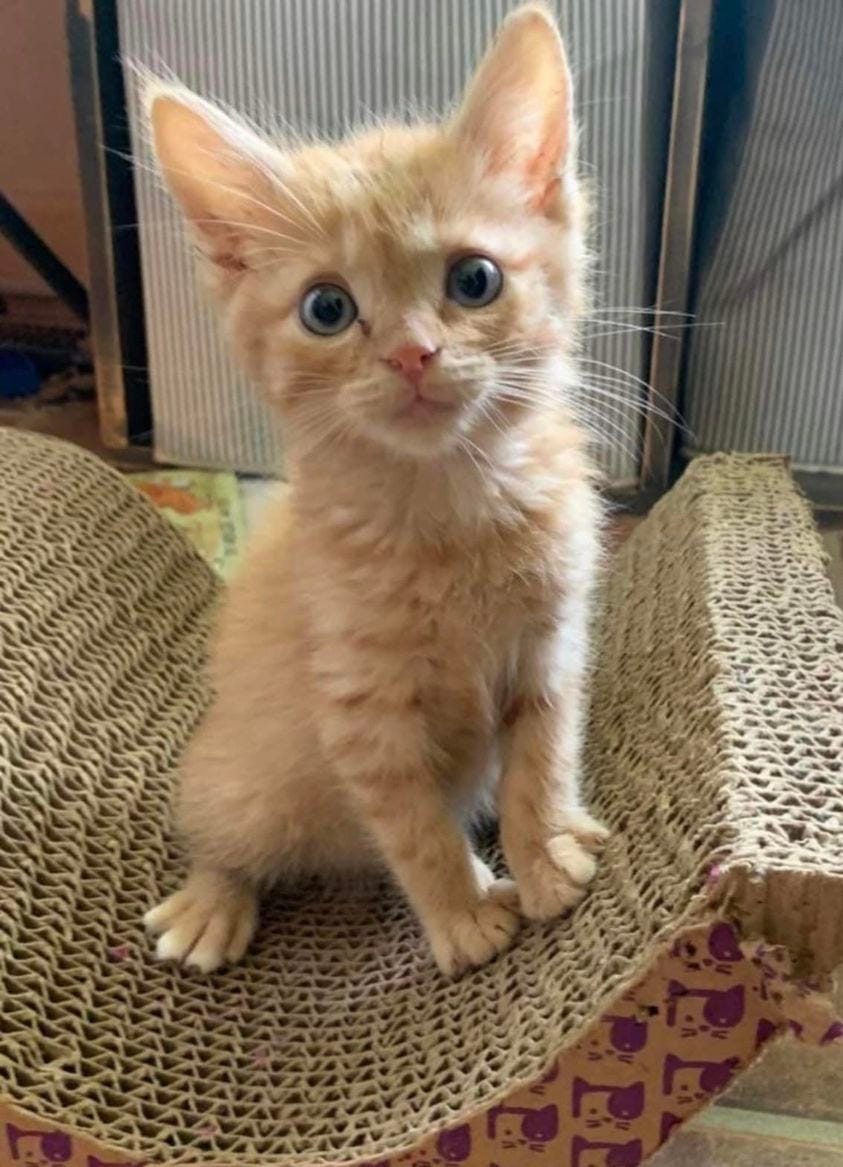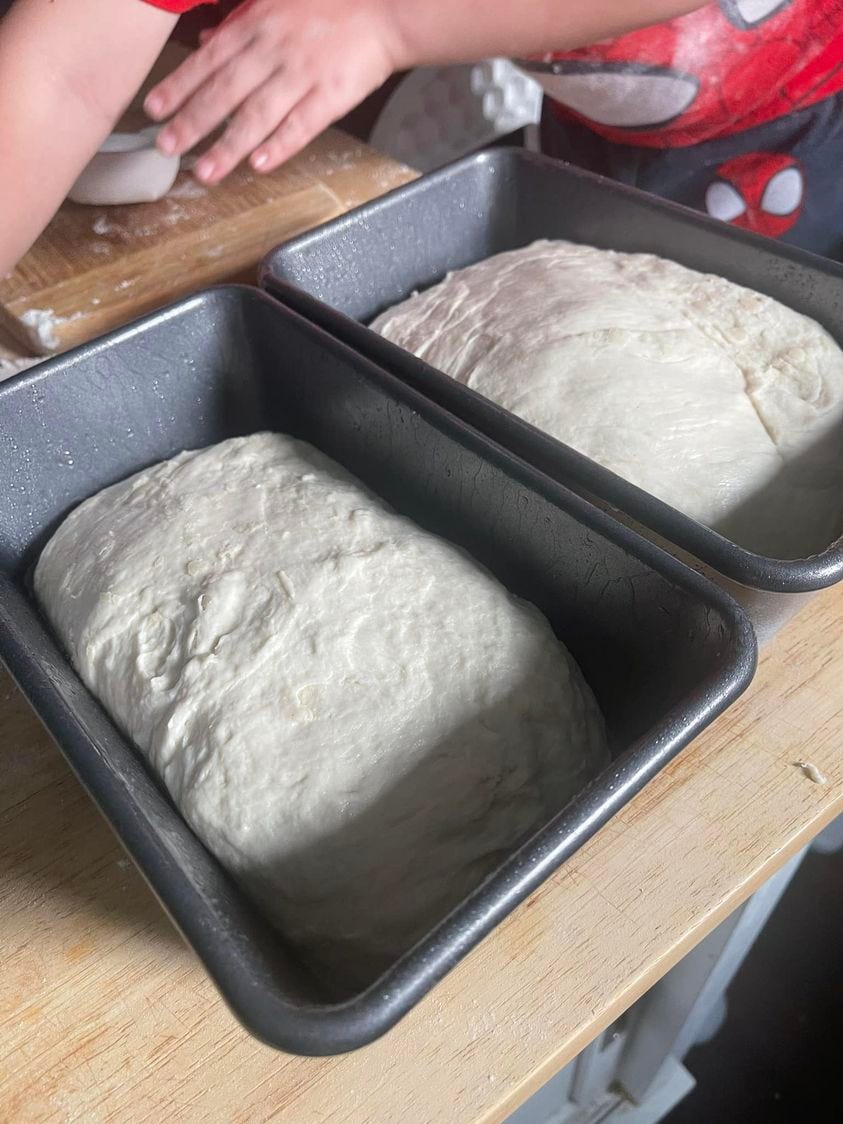This is a continuing story about a medical emergency I suffered through late last year. You can find the first part of the story here.
It turns out, even once you’re healed from a medical trauma, you’re not really healed — or, at least, that’s what I’m continuing to discover about my own situation, these six or seven months on from the events in the first part of this story.
The last edition was primarily about loss, and so is this one, even though I’m not sure I’ve thoroughly dealt with the loss at the center of the problem. I can’t. There’s too much to process around the loss and it just feels so…huge. So, bear in mind, this could be a triggering story, and again, I’ll include an adorable photo, this time of a kitten, to give you time to make the choice to stay or go. I won’t be offended, either way.
I’ve had miscarriages before. Once, in the early days before I found out I had stage 4 endometriosis, I was briefly thrilled to find out I was pregnant, only to, well, not be. They call it a chemical pregnancy, when just a faint line shows up on a test — enough to trigger a positive — but the rest of the body doesn’t really get the message.
The second time, I was in a more precarious place. I’m Catholic, blindingly so, and we didn’t use IVF, struggling for nearly eight years to get pregnant — something I didn’t even know I wanted until I couldn’t have it. After months of fine tuning, we were getting the medications perfectly right, triggering beautiful cycles, with several eggs, just waiting to become babies. But they weren’t becoming babies. My endometriosis, which had gone unnoticed — and untreated — since college, wasn’t producing symptoms, but it was busily fusing my internal organs together. Once that was cleared, through my first surgery, I got pregnant right away.
For a while.
That one hurt. It felt almost like a personal attack. All this time, all this effort, all this pain and all these shots and ultrasounds, and I tasted success only to have it, and a child, ripped away. That seemed…normal somehow, though — an experience a quarter of women can relate to, and they came out in droves to help. Friends I never knew I had. Six months later, I was pregnant again, this time with twins, which turned out to be the most harrowing experience of my life up until then. I barely moved off the sofa the first several months, terrified, against logic, that I’d move incorrectly or jostle myself, or eat the wrong thing, even if, logically, none of that really mattered.
This time, though, the miscarriage is harder to process, because it feels so intense, and unlike in previous losses (and wins), I had to make a decision, that wasn’t really a choice, to do something I’d not had to do previously, not that the decision was every really mine to make. Either one of us wasn’t going to survive, or both of us weren’t. I don’t know if the baby was still even living at the time of the procedure; I can’t know. They didn’t tell me and that makes all the difference. The only one who spoke about it was the priest, to reiterate that my faith had the answers, and my faith knew what was happening and had provided for it.
Months later, the lost baby would still be providing; after my midnight tweet went viral, Tennessee legislators, who had previously clashed to a stalemate over carving an explicit exception (in addition to an existing implicit one) for ectopic pregnancy into the state’s ban on abortion, adopted language to make sure no one was ever turned away from an emergency room for what I’d experienced. I hadn’t been, of course.
The final report never mentioned remains, but the hospital called weeks later to ask me to pick up what was left, the ashes. There’s no dignified way to hand someone a box like that, and they did what they could; the gift bag they’d packaged it was, at least, black, so that the baby itself never had to endure the indignity of being tossed into something glittery.
Yes, it was a gift bag. With tissue paper. And a pamphlet about loss, handed over in a hospital lobby. I carried it to my car. I left it there for a while. I moved it to my closet. When we moved houses, I put it back in my car. I briefly lost it, found it, and stuffed it in an office bookcase. I thought about upgrading the baby’s final resting place for a while, until some day he or she is buried in consecrated ground with me, but Google searches for baby memorials turned up only the most bizarre temporary residences. At one point, I ended up having to share the photos with a friend, just so I wouldn’t have to laugh alone. I was grieving, sure, but I couldn’t bring myself to order the Build-a-Bear with the special space for a vial of ashes. Or the laser-etched glass sculptures of non-descript babies, or the poorly sculpted silver hands holding the whatever remained of my own child.
And those are the better options.
I only recently learned I could use AI to create a mockup of my child’s face and then 3D print it out of resin, because this wasn’t enough of a nightmare.
Ultimately, I bought a little Japanese figure. A Jizo, who, in the Japanese tradition, holds these “water babies” in secret pockets in his robes and smuggles them into heaven. In the Buddhist tradition, he also brings the babies toys and snacks that parents leave at little shrines, but being Catholic, I was just comforted to know it’s possible someone was keeping the baby warm at night in the folds of a monk’s robe, bypassing any controversial Catholic understanding of what happens to the unbaptized when they pass. No “Limbo” here, just the soft wool of a sweet old man’s clothes and plenty of treats.
He sits in a private space, a connection to someone I’ve never met but love anyway.
At no time, though, have I thought much of the baby — what they looked like, what they should be named, whether they’d finally made it somewhere eternal — because I just can’t. Just like I can’t think much of anything.
And that’s where the six lost months come in.
I’d heard of PTSD sort of in passing, but I’d always assumed it happened to people with much greater trauma. Car accidents, kidnappings, war. The kinds of things that terrify us, the fears we know and understand and that haunt our nightmares. No one, in a vacuum, has a nightmare about an ectopic pregnancy rupturing, like they do of careening hood-first off a cliff in a car.
But the next six months were some of the most consequential of my life: we made the decision to stay in Nashville and not move home to Chicago, selling off a house there and buying one here, with land and lots of bedrooms, in a neighborhood we’d grown to love far more than we ever expected to. I did my job, where my focus wasn’t so much on my daily duties, but why a company had been so intent on hiring me, only to terminally underutilize and undermine me at every opportunity. My blood pressure was sky high, my stress level over the top, but it afforded me the luxury of worrying about something else.
I’d finally decided to leave that job, but they got to me first, laying me off with the rest of the investigators, just as we’d reached the middle of the mortgage underwriting process. Two weeks later, I had a new job — a creative job — but I also had a house to sell, and a house to buy, and a minivan that had been eaten by squirrels, a trusted handyman in Chicago that stole $5,000 before completing any work, and a rental house that had to be cleaned out, and movers that somehow didn’t know they’d been hired to move things, despite the company’s motto being plastered on the side of their truck.
I’ll tell that story some other time.
It was only when everything stopped — we were moved in, houses bought and sold, job contracts inked — that all of what happened hit me, with full force, like that cliff-diving car wreck, all at once, but, inconveniently, without informing the active part of my psyche.
What I didn’t understand about PTSD is that any trauma qualifies, and that you don’t always have the symptoms that you see on television: the crippling anxiety and mid-day flashbacks and the sudden sobbing in terror. Instead, it came on silently, drawing a sort-of invisible wall between me and my world, as if I were suddenly staring into my life through a pane of glass, like it was a storefront or a gallery exhibition. Instead of being isolating, though, it was angering and frustrating. I found myself just suddenly becoming overwhelmed and, from there, enraged. I was so unable to process what I was feeling, my emotions just became a guiding force in my life. No one was safe. I suddenly despised everything, including my children. My life felt meaningless, because I couldn’t access anything — not the sadness, but also no happiness, no hope, no joy. It seemed impossible to see and feel, because there was this wall that separated me from touching and sensing anything in the surroundings of my existence.
I’d say it was like a sensory deprivation chamber, but I’ve never experienced one of those. I think it may be, somewhat, like the final moments before going over the top of the first, highest hill on a roller coaster. All knowing what’s happening, but the experience of falling isn’t quite there yet, so all you can do is experience the fear and excitement in absentia. It’s a mirror world of someone else’s feelings and experiences, the closest maybe we ever come to being the cave dwellers, seeing Plato’s shadows on the wall, imprisoned from childhood but not birth, so there are faint memories of taste and smell, and sadness and love, blueprints etched into our minds, but not there.
At one point, the aforementioned kitten was the only thing keeping me barely plugged into reality, and, in a way, my life. He forced himself into my sphere, maybe because he’d also just experienced something traumatic, leaving his mother and everything he knew in a jumble of car rides and foreign humans. I moved from cats to sourdough; I made bread. It felt dumb, but I was creating something new, not just willing myself to survive, but willing something else to. I got peace. And a third-degree burn. You have that story to look forward to, too.
Eventually, I saw the wall. The glass. I hit it one night like a blind bird, when I was, as had become usual, angry at my husband for something he hadn’t really done, or at least done recently — it was an anger I couldn’t place, and then I ran into the wall, the window. I found it, fumbling around in the dark for something to access in my brain to be angry about just so that I could continue being angry at someone for something.
And that was it. That’s what it took to smash my way back into my life. There are months ahead of me, of therapy, of writing, of looking back and trying to piece together everything I missed or made worse, trying to see the details in these paintings of memories, just in case I’ve entirely ignored something important. It’s a big job, but writing this, for you — for me — helps. And sooner or later, it means I can go back to being funny. Maybe even funnier.
That’s where this all leads. Whether anyone has seen this or not, whether anyone finds it interesting, that’s all immaterial, because it’s a collection of thoughts I’ve been ignoring, deliberately and accidentally, for months, because it was easier to access just about anything else. It’s all, ultimately, for me, so that I can know that I wasn’t dreaming it all.
The stories will continue next week. You can follow my life in Nashville here, the day-to-day trials of a house full of toddlers on Twitter, and whatever comes into my mind on Instagram.







I completely understand what you mean by "What I didn’t understand about PTSD is that any trauma qualifies, and that you don’t always have the symptoms that you see on television." We experienced a very traumatic adoption situation. And even years removed from it now, I can hear or even smell something that takes my right back to that place of anxiety, fear, depression, etc. I also understand what you mean about writing helping you to process your experience. I wrote a blog of our adoption experience. And it really did help, even if only 2 people ever read it. Praying for you!
Love you. I crashed in December 2019 after a year and a half of various forms of hell. I barely remember one of my kid’s first year of life. Then Covid hit and it really took until about March of this year to start feeling *healed* ... but it happened and is still happening on the daily. I really don’t understand life sometimes, but it does go on. We just gotta fight to go with it.